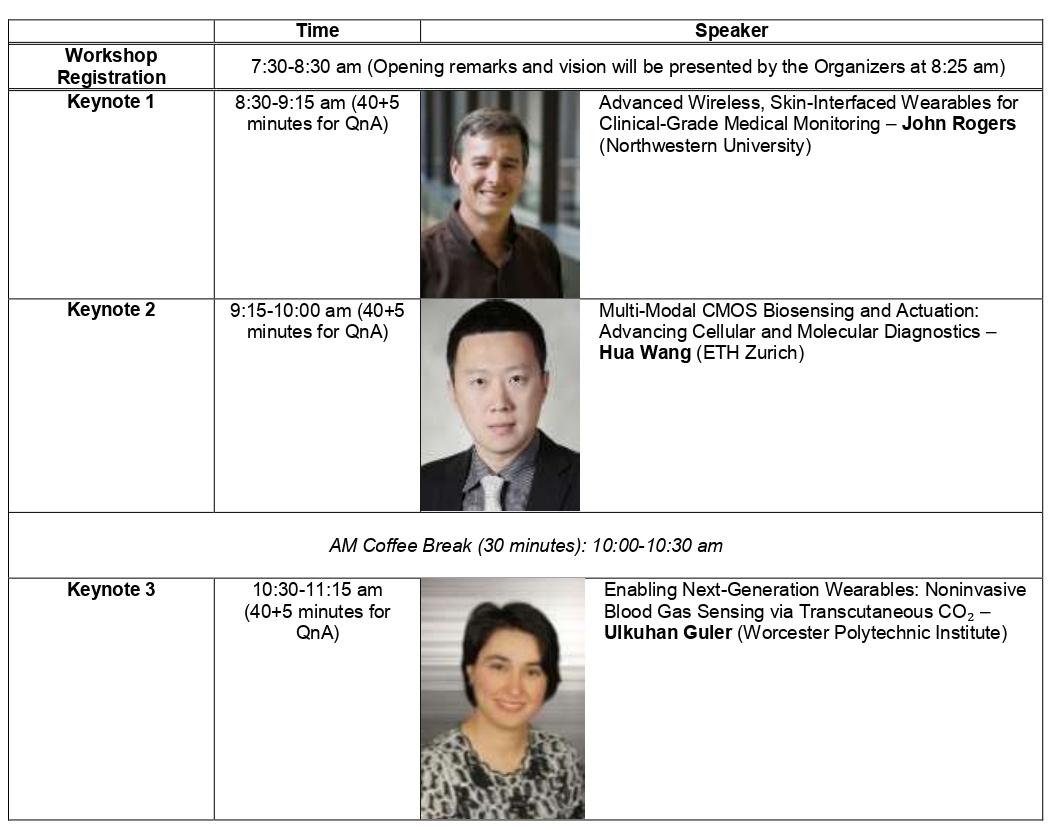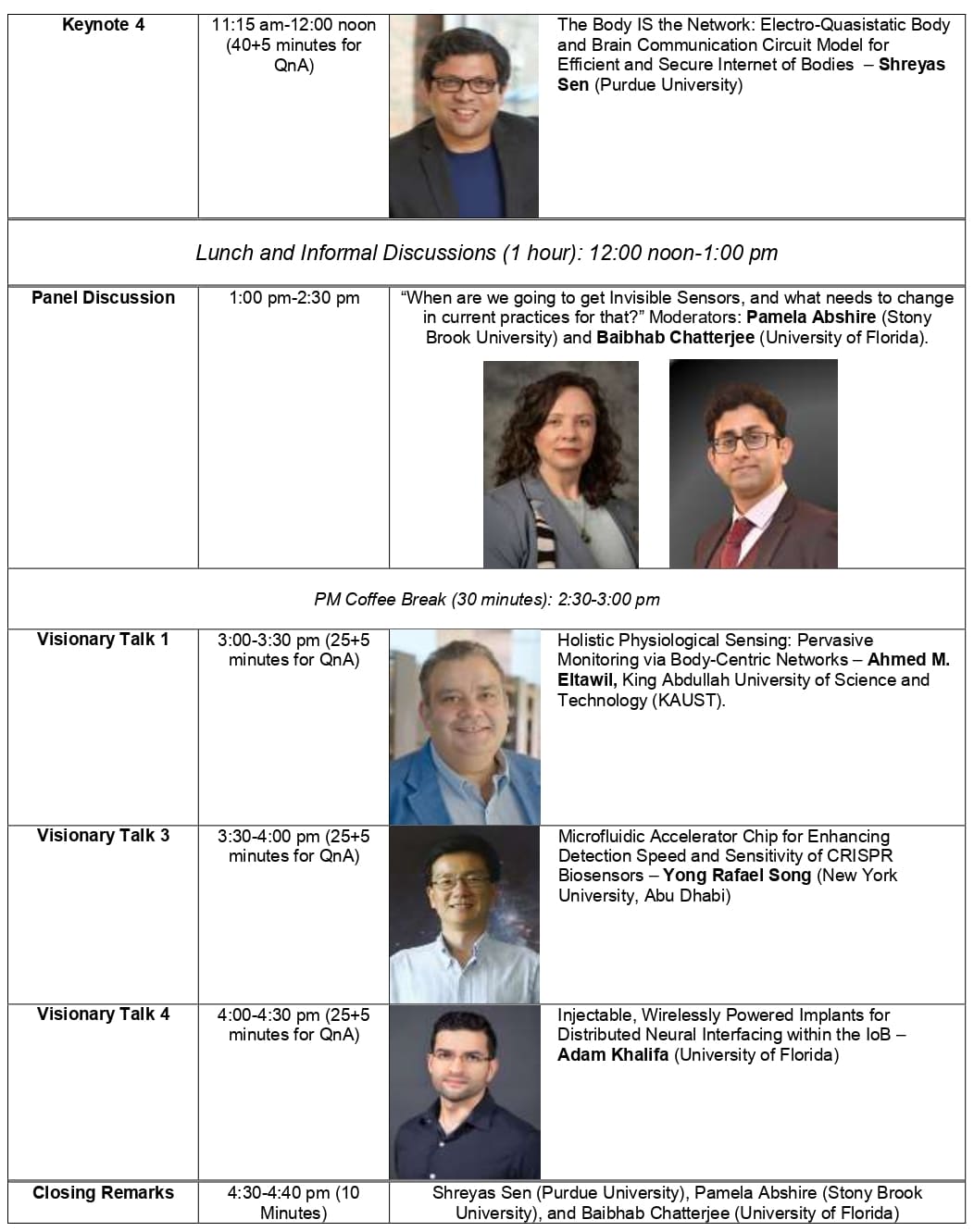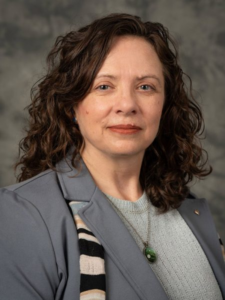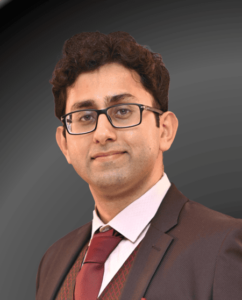Co-located BioCAS2025 Workshop
IEEE CASS Workshop on Intelligent Connected Wearables and Implants for Next-Generation Bioelectronics
Date: October 15, 2025
Venue: Khalifa University, Abu Dhabi, UAE
Organizers: Shreyas Sen (Purdue University), Pamela Abshire (Stony Brook University), and Baibhab Chatterjee (University of Florida)
» Description, Goal and Purpose
» Focus Area: Cross-cutting, among (1) Biosensor circuits, devices and materials; (2) Body area/sensor networks, closed loop systems and continuous monitoring; (3) Bio-inspired sensing, processing and communication; (4) Emerging technologies for low power and secure Bio-Electronics
» Abstract:
Over the last decade, we have seen rapid advancements in wearable technologies and implantable devices, which has an immense potential to transform the way we monitor and manage our health. The future wearables and implants are envisioned to be equipped with a range of interconnected sensors and actuators, enabling real-time tracking of vital signs as well as closed-loop bio-sensing and actuation in the form of drug delivery, neuromodulation, and medication adherence. Such a network of connected devices will form the next generation of intelligent wireless body-area networks (WBAN), already being called the “Internet of Bodies” (IoB) that collect, analyze, and share personal health information and/or alter the human body’s function.
However, developing such IoB technologies will require significant improvements in the way we design today’s biomedical sensing, processing, and data transfer modules, eventually creating systems that can continuously sense for chronic applications, communicate securely among themselves (as well as with access points), and eventually take life-saving decisions on-the-fly. This workshop will delve into the latest developments and trends in sensing, in-sensor analytics, secure communication, as well as wireless power transfer for wearables/implants, all of which will cohesively help in realizing IoB systems. We will also discuss the potential of such connected devices for improving patient outcomes, personalized medicine, and disease prevention.
» Keywords: internet of bodies (IoB), sensing, processing/in-sensor-analytics, data communication, wireless powering, ultra-low power, secure, sensor networks.
» Rationale and Importance to BioCAS 2025:
We believe this topic is both innovative and timely, making it an excellent fit for BioCAS 2025. It aligns closely with the conference’s focus on “Biomedical Circuits and Systems for Precision Medicine,” which needs developments in areas such as intelligent sensing, analytics, communication, powering, and security of distributed body-sensors which calls for innovative systems, circuits, devices and material design for direct betterment of human lives.
» Target Audience:
The target audience for this workshop is the biomedical circuits and systems community, as well as its parent and sister communities including biomedical engineering, sensor devices and technology development, as well as solid-state circuits and systems. The categories of the audience that will get benefit from this workshop are:
- Professionals (from Industry/Academia) with interest in low-power, secure, and biocompatible sensor node design for a diverse set of IoB applications.
- Professionals and students who have interest in learning more about medically accepted protocols and clinical trials, interface standardization, device security, and healthcare data privacy
- Students (undergraduate/Graduate) who want to explore careers in circuits and systems design for applications in IoB/healthcare.
» Target/Desired Outcome
The expected outcome of this workshop would be to engage the CASS/BioCAS community with researchers in fundamental biomedical sciences and engineering, as well as with broader biomedical communities, institutes and industry. A large focus will be on the societal translation of biomedical engineering concepts. It is also expected that this workshop (as a continuation of the BioCAS 2024 CASS Workshop on Medical Wearables organized by Dr. Ibrahim Elfadel and Dr. Pamela Abshire) will create a continuity of discussions, and future forums on relevant ideas originated from this workshop.
» Tentative Agenda
This Workshop consists of 4 keynote/plenary talks and a panel discussion in the morning session, followed by a panel and 3 invited visionary talks in the afternoon session. The details are provided below.


Note: Conference Welcome Reception will be held at 6 pm.
Biographies of the Workshop Organizers:
Dr. Shreyas Sen:
Elmore Associate Professor of ECE & BME, Purdue University:
https://engineering.purdue.edu/~shreyas/SparcLab/home.html#
Director, Center for Internet of Bodies (C-IoB): https://engineering.purdue.edu/C-IoB
Co-Founder and CTO, Ixana: https://www.ixana.ai/

Dr. Shreyas Sen is an Elmore Associate Professor of ECE & BME, Purdue University. His current research interests span mixed-signal circuits/systems and electromagnetics for the Internet of Bodies (IoB) and Hardware Security. He has co-authored 3 book chapters, over 200 journal and conference papers and has 25 patents granted/pending. Dr. Sen serves as the Director of the Center for Internet of Bodies (C-IoB) at Purdue.
Dr. Sen is the inventor of the Electro-Quasistatic Human Body Communication (EQS-HBC), or Body as a Wire technology, for which, he is the recipient of the MIT Technology Review top-10 Indian Inventor Worldwide under 35 (MIT TR35 India) Award in 2018 and Georgia Tech 40 Under 40 Award in 2022. To commercialize this invention Dr. Sen founded Ixana and serves as the Chairman and CTO and led Ixana to awards such as 2x CES Innovation Award 2024, EE Times Silicon 100, Indiana Startup of the Year Mira Award 2023, among others. His work has been covered by 250+ news releases worldwide, invited appearances on TEDx Indianapolis, NASDAQ live Trade Talks at CES 2023, Indian National Television CNBC TV18 Young Turks Program, NPR subsidiary Lakeshore Public Radio and the CyberWire podcast.
Dr. Sen is a recipient of the NSF CAREER Award 2020, AFOSR Young Investigator Award 2016, NSF CISE CRII Award 2017, Intel Outstanding Researcher Award 2020, Google Faculty Research Award 2017, Purdue CoE Early Career Research Award 2021, Intel Labs Quality Award 2012 for industry wide impact on USB-C type, Intel Ph.D. Fellowship 2010, IEEE Microwave Fellowship 2008, GSRC Margarida Jacome Best Research Award 2007, and nine best paper awards including IEEE CICC 2019, 2021 and in IEEE HOST 2017-2020, for four consecutive years. Dr. Sen’s work was chosen as one of the top-10 papers in the Hardware Security field (TopPicks 2019). He serves/has served as an Associate Editor for IEEE Journal of Solid State Circuits (JSSC), Solid-State Circuits Letters (SSC-L), Nature Scientific Reports, Frontiers in Electronics, IEEE Design & Test, Executive Committee member of IEEE Central Indiana Section and Technical Program Committee member of TPC member of ISSCC, CICC, DAC, CCS, IMS, DATE, ISLPED, ICCAD, ITC, and VLSI Design. Dr. Sen is a Senior Member of IEEE and Distinguished Lecturer of the IEEE SSCS society.
Dr. Pamela Abshire:
Professor, Electrical and Computer Engineering, Stony Brook University, New York: https://isr.umd.edu/clark/faculty/347/Pamela-Abshire

Dr. Pamela Abshire is currently the Professor and Chair in the Department of Electrical and Computer Engineering at Stony Brook University, New York. She was with the Department of Electrical and Computer Engineering and the Institute for Systems Research at the University of Maryland, College Park during 2001-2025. Her areas of specialty are in the fields of VLSI circuit design and bioengineering. Dr. Abshire’s research focuses on better understanding the tradeoffs between performance and resources in natural and engineered systems. Her research interests also include information theory for physical systems, noise theory for electronic, photonic, and biological systems, analysis and design of sensory information processing systems, and algorithm, VLSI circuit, and microsystem design, especially for low power applications.
She received her Ph.D. and M.S. degrees from The Johns Hopkins University in 2001 and 1997, respectively, and B.S. degree in Physics with Honors in 1992 from the California Institute of Technology in Pasadena, CA. Between 1992 and 1995 she worked as a Research Engineer in the Bradycardia Research Department of Medtronic, Inc. in Minneapolis, MN. Dr. Abshire is a Fellow of the Institute of Electrical and Electronics Engineers (IEEE) and a Member at Large of the Board of Board of Governors of the IEEE Circuits and Systems Society (CASS).
Dr. Baibhab Chatterjee:
Assistant Professor, Electrical and Computer Engineering, University of Florida: https://chatterjee.ece.ufl.edu/
Associate Director, Center for Internet of Bodies (C-IoB): https://engineering.purdue.edu/C-IoB

Dr. Baibhab Chatterjee is an Assistant Professor in the Department of Electrical and Computer Engineering (ECE) at the University of Florida, and directs the Wireless Intelligent Sensor Electronics (WISE) Lab. He received his Ph.D. from the Elmore Family School of Electrical Engineering, Purdue University, West Lafayette, IN, USA in 2022. Before that, he worked as a Senior Digital Design Engineer in Intel, during 2015-2017, and also as a Research and Development Engineer in Tejas Networks, during 2011-2012. He was a Hardware Design Intern with IBM T.J. Watson Research Center, NY, USA during 2020-2021, where he worked on ultra-low power transceiver front-ends.
Baibhab’s research interests include low-power analog, RF, and mixed-signal circuit design for next-generation biomedical applications, along with signal processing and network-level designs of interconnected bio-nodes which is essential for implementation of the Internet of Bodies (IoB). Baibhab has published over 80 peer-reviewed conference and journal papers in the area of low-power sensing and communication circuits for body-area-network and IoB applications, and has 7 granted/pending patents. He is the recipient of the NSF CAREER Award (2025), the Eaton Award in Design Excellence (2023), and multiple best paper/poster awards, including HOST 2018 (3rd), CICC 2019, HOST 2019
CICC 2021, and the RFIC/IMS 3MT Audience Choice Award (2020).
To increase the awareness on the sub-area of emerging technologies for sensing, powering, computation and communication in biomedical nodes, Baibhab organized a special session on “Next-Gen Wearables and Implants” in the IEEE Biomedical Circuits and Systems Conference (BioCAS) 2023 which focused on new technologies in biomedical applications. Baibhab also organized a special session on “Pioneering Wireless Technologies for Wearables and Implants” in the 66th IEEE International Midwest Symposium on Circuits and Systems (MSWCAS) 2023, which was targeted toward exploring the recent advances in wireless technologies for wearables and implants.
